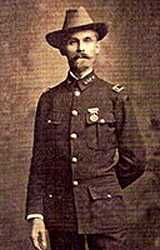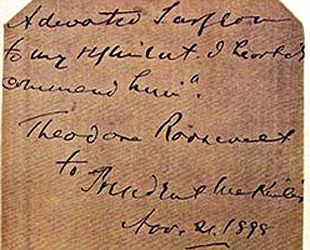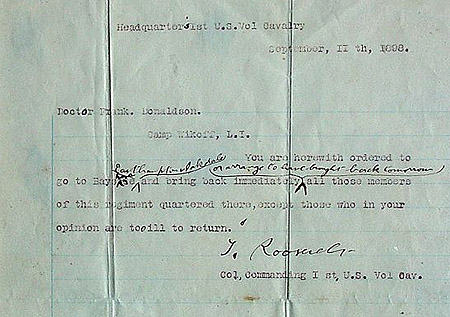
Lt. Frank Donaldson,
Assistant Surgeon of the Rough Riders
By Patrick McSherry, with data contributed by Peter Amabile

By Patrick McSherry, with data contributed by Peter Amabile


General:
Frank Donaldson served with the 1st
U.S.
Volunteer Cavalry ("Rough Riders") as an assistant surgeon.
The Biography:
Born in 1856, Dr. Donaldson graduated from Harvard in 1879, the University of Maryland in 1882, and then did post-graduate work at Johns Hopkins University. He became the chief of clinic for nose and throat diseases at the University of Maryland. This was followed by work in Germany and Russia for the Equitable Life Insurance Company from 1888 to 1890. In 1880, Donaldson married Nannie Beirne McFarland. The couple had a son, Francis.
Dr. Frank Donaldson was a resident of New York, making his home at 44 West Forty-fourth Street at the time of the war. A friend of Theodore Roosevelt's, he joined the 1st U.S. Volunteer Cavalry ("Rough Riders") on July 9th in Washington DC as a 1st Lieutenant and Assistant Surgeon. He was soon en-route to Cuba. Less than two weeks later, on July 24, he was stricken with yellow fever.
Dr. Donaldson was with the regiment at Camp Wikoff at Montauk Point, Long Island, where it was sent upon arriving in the U.S. on August 14, 1898. The regiment was mustered out by September 15. Dr. Donaldson remained behind. Many of those Rough Riders still in town seem to have held court at the Hoffman House. While there, Donaldson requested that any city hospitals with members of the regiment in their care contact him, so that he could provide for their continued care.
As the war began to draw to a close, Donaldson was required to appear before the commission investigating the conditions that existed within hospitals during the war. The main thrust of the investigation had to do with conditions at Camp Wikoff. The main thrust of his testimony was that the doctors tried their best but were overworked. The nurses and stewards provided were often inefficient, and the stewards were generally of “a most undesirable character.” The doctor indicated that supplies were often unavailable, and that the supplies that were received by his regiment being those that the members of the regiment “hustled for.” Dr. Donaldson did indicate that he believed that many of the terrible stories concerning Camp Wikoff were untrue.
Frank Donaldson wrote a poetic description of a soldier’s service in Cuba and the suffering endured by the Americans in fighting for the freedom of the Cuban people, apparently written largely while in the hospital at Siboney . The work was entitled “A Cuban Idyll” and the work was respectfully dedicated to Theodore Roosevelt.
Following the war, in July and August of 1899, yellow fever broke out among returning troops at Hampton, Virginia, in the shadow of Fort Monroe. Surgeon General Wyman ordered a number of medical personnel to the area to deal with the possible spread of the contagion. In doing so, Acting Assistant Surgeon Donaldson was ordered south, to help handle the outbreak at the nearby town of Phoebus. In medical theory of the time, Dr. Donaldson was mistakenly thought to be immune to the disease, having had it while in Cuba.
As the campaign for the governor of New York began to gather steam, and Donaldson’s friend and former commander, Roosevelt, was on the ticket, Donaldson “formally sought the privilege” of campaigning for his fellow Rough Rider.
Dr. Donaldson stayed with the military, and became the surgeon and first lieutenant of the 45th U.S. Volunteer Infantry, which served in the Philippines during the Philippine-American War. The endorsement on the rear of the photo at the top of this page may have been related to his obtaining this position with the 45th U.S. Volunteers.
Dr. Donaldson had passed away in 1906.

Orders from Col. Theodore Roosevelt to Lt. Frank
Donaldson. Interstingly, whoever typed the orders
repeatedly use the capital letter "I" instaed of the
number "1." The orders read:
Headquarter's Ist U.S. Vol Cavalry
September II th, 1898.Doctor Frank. Donaldson.
Camp Wikoff, L.I.
You are herewith ordered to go to Bayside, Easthampton or Oakdale and bring back immediately or arrange to have brought back tomorrow all those members of this regiment quartered there, except those who in your opinion are too ill to return.
T. Roosevelt
Col, Commanding Ist U.S. Vol. Cav
Amabile, Peter - photo and brief biography of Donaldson's college career, marriage and service with the 45th U.S.V.
"Fear of the Fever a Common Ailment," Lincoln Evening News. (Lincoln, Nebraska), August 3, 1899.
NAIL online records - http://narademo.umiacs.umd.edu/cgi-bin/isadg/viewobject.pl?object=10632&tab=2 and http://narademo.umiacs.umd.edu/cgi-bin/isadg/viewobject.pl?object=6327
"Naval Hospital at Norfolk," Galveston Daily News. (Galveston, Texas), August 3, 1899, 1.
"Republican Battle Plans," New York Times. October 8, 1898.
"Rough Riders Celebrating," New York Times. September 17, 1898, 12.
"War Investigations," The News. (Frederick, Maryland), November 19, 1898, 1